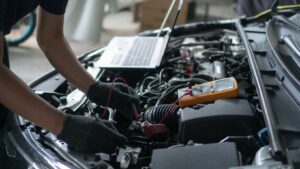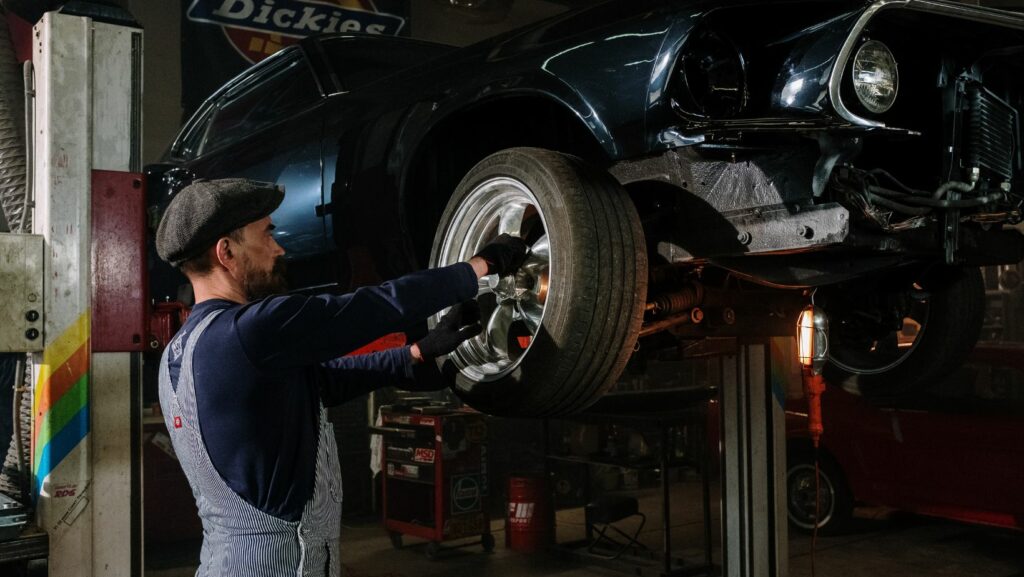What Maintenance Does a Car Need
- Regular Maintenance is Essential: Consistent car maintenance, including oil changes, tire rotations, and fluid checks, is crucial for optimal performance, safety, and longevity.
- Key Maintenance Tasks to Prioritize: Essential tasks include changing engine oil every 5,000 to 7,500 miles, rotating tires every 6,000 to 8,000 miles, and inspecting brakes every 10,000 miles.
- Routine Fluid Checks: Regularly inspect key fluids (engine oil, coolant, brake fluid, power steering fluid, and transmission fluid) to prevent leaks and overheating, enhancing vehicle reliability.
- Seasonal Maintenance Needs: Tailor maintenance for summer and winter conditions—check batteries, antifreeze levels, and tire conditions to ensure safe driving in extreme weather.
- Prevent Common Issues: Address common car problems like overheating, battery failure, and brake issues through regular inspections and maintenance, preventing costly repairs and ensuring safety.
- Stay Informed on Maintenance Schedules: Understanding and adhering to manufacturer-recommended maintenance schedules can lead to a smoother, safer driving experience and prolong vehicle lifespan.
Owning a car comes with the responsibility of keeping it in top shape. Regular maintenance is crucial not just for performance but also for safety and longevity. Understanding what maintenance a car needs can save drivers from costly repairs and unexpected breakdowns.
From oil changes to tire rotations, each task plays a vital role in ensuring a smooth ride. Neglecting these essential services can lead to diminished fuel efficiency and increased wear and tear. By staying informed about maintenance schedules and requirements, car owners can enjoy peace of mind knowing their vehicle is reliable and ready for the road ahead.
What Maintenance Does A Car Need
Regular maintenance keeps cars running smoothly and safely. Key tasks include:

- Oil Change: Change engine oil every 5,000 to 7,500 miles to maintain optimal engine performance.
- Tire Rotation: Rotate tires every 6,000 to 8,000 miles to ensure even wear and extend tire life.
- Brake Inspection: Check brake pads and fluids every 10,000 miles. Replace pads when worn to enhance safety.
- Fluid Checks: Inspect coolant, transmission, brake, and power steering fluids regularly to prevent leaks and overheating.
- Battery Maintenance: Test battery condition annually and replace it every 3 to 5 years to avoid starting issues.
- Air Filter Replacement: Change engine air filters every 15,000 to 30,000 miles to improve airflow and engine efficiency.
- Wiper Blade Replacement: Replace wiper blades every 6 to 12 months for clear visibility during inclement weather.
- Belts and Hoses Inspection: Examine belts and hoses every 30,000 miles for signs of wear or cracking to prevent breakdowns.
- Alignment Check: Schedule wheel alignments every 6,000 miles to ensure proper handling and tire wear.
Sticking to these maintenance tasks ensures that cars remain reliable, safe, and efficient for drivers.
Essential Maintenance Tasks
Regular maintenance tasks significantly enhance vehicle performance, safety, and longevity. Car owners should prioritize these tasks to prevent costly repairs and maintain reliability.
Oil Changes
Changing engine oil consistently is crucial for optimal engine performance. Engine oil should be changed every 5,000 to 7,500 miles, or as recommended by the manufacturer. Fresh oil lubricates engine components, reducing wear and improving fuel efficiency. Neglecting oil changes can lead to engine overheating and permanent damage.
Tire Maintenance
Tire maintenance involves regular inspection and rotation. Tires should be rotated every 6,000 to 8,000 miles to ensure even wear. Checking tire pressure at least once a month maintains proper inflation. Properly inflated tires enhance fuel efficiency and driving safety. Additionally, inspecting tread depth regularly helps identify the need for replacements, ensuring adequate traction on roads.
Routine Checks
Routine checks are vital for maintaining a car’s performance and preventing unexpected issues. Regularly inspecting key components can enhance vehicle reliability and safety.
Fluid Levels
Fluid levels play a critical role in vehicle operation. Car owners must check engine oil, coolant, brake fluid, power steering fluid, and transmission fluid.
- Engine Oil: Check oil levels monthly. Low oil can lead to severe engine damage.
- Coolant: Check the coolant reservoir regularly. Insufficient coolant can cause the engine to overheat.
- Brake Fluid: Ensure brake fluid is at the recommended level. Low fluid affects brake responsiveness.
- Power Steering Fluid: Inspect fluid levels to maintain smooth steering.
- Transmission Fluid: Regularly check transmission fluid levels to avoid shifting issues.
Belts and Hoses
Belts and hoses are essential for vehicle function and safety. Routine inspections help prevent breakdowns.
- Timing Belt: Inspect the timing belt every 60,000 to 100,000 miles for wear. A worn belt can lead to engine failure.
- Serpentine Belt: Check the serpentine belt for cracks or fraying. Replace it every 60,000 to 100,000 miles.
- Hoses: Examine hoses for leaks or cracks. Replace any hose that shows signs of wear or damage.
By conducting these routine checks, car owners can ensure their vehicles operate smoothly and efficiently.
Seasonal Maintenance
Seasonal maintenance plays a crucial role in ensuring a vehicle’s optimal performance throughout the year. Recognizing specific tasks suited for summer and winter conditions enhances safety and reliability.
Winter Preparation
 Winter preparation involves several essential tasks that equip a vehicle for cold and harsh weather. Car owners should check the battery, as cold temperatures can weaken its performance. Inspect the antifreeze level and ensure it meets the recommended mixture, preventing engine freeze.
Winter preparation involves several essential tasks that equip a vehicle for cold and harsh weather. Car owners should check the battery, as cold temperatures can weaken its performance. Inspect the antifreeze level and ensure it meets the recommended mixture, preventing engine freeze.
Examine tires, focusing on tread depth and pressure; winter tires provide better traction. Replace wiper blades with winter-grade options for improved visibility in snow and rain. Additionally, consider adding winter-grade oil for better engine flow in low temperatures, offering better lubrication and fuel efficiency.
Summer Care
Summer care focuses on preventing overheating and ensuring smooth operation in hot conditions. Car owners should inspect coolant levels and check for leaks in hoses and connections. Maintain tire pressure and tread, as heat can increase tire wear and decrease fuel efficiency. Regularly check the air conditioning system to ensure it operates effectively, providing comfort during hot months. Replace cabin air filters as needed to improve air quality and reduce strain on the system. Additionally, inspect the battery, since higher temperatures can accelerate corrosion, reducing its lifespan.
Common Issues and Solutions
Car maintenance can prevent common issues that arise from neglect. Understanding these problems and their solutions helps maintain vehicle reliability and safety.
Engine Overheating
- Causes: Low coolant levels, faulty thermostat, or leaking hoses lead to overheating.
- Solutions: Check coolant levels regularly, replace faulty thermostats, and inspect hoses for leaks.
Battery Failure
- Causes: Corrosion, loose connections, or age lead to battery issues.
- Solutions: Clean battery terminals, ensure connections are tight, and replace the battery every 3 to 5 years.
Brake Issues
- Causes: Worn brake pads or low brake fluid levels can compromise braking efficiency.
- Solutions: Inspect brake pads every 20,000 miles and top off brake fluid as needed.
Tire Problems
- Causes: Low tire pressure, uneven wear, or inadequate tread depth cause tire issues.
- Solutions: Check tire pressure monthly, rotate tires every 6,000 to 8,000 miles, and replace tires when tread depth falls below 2/32 of an inch.
Fluid Leaks
- Causes: Worn seals, gaskets, or connections can cause fluid leaks.
- Solutions: Regularly inspect under the vehicle for leaks and replace damaged seals or gaskets promptly.
Air Conditioning Failure
- Causes: Low refrigerant levels or faulty components cause air conditioning issues.
- Solutions: Check refrigerant levels and recharge when low, inspect and replace components as needed.
- Causes: Electrical issues or blown fuses lead to unresponsive dashboard lights.
- Solutions: Check fuses and wiring connections, and replace faulty bulbs for proper indicator functionality.
Regular attention to these common issues ensures a vehicle operates efficiently, enhancing safety and performance.
Provides Peace of Mind
Regular car maintenance is essential for ensuring safety and prolonging the life of any vehicle. By staying proactive with tasks like oil changes tire rotations and fluid checks car owners can avoid costly repairs and unexpected breakdowns. Seasonal maintenance also plays a crucial role in keeping vehicles running smoothly throughout the year.
Understanding the importance of these maintenance tasks empowers car owners to take control of their vehicle’s health. With consistent attention to detail and a commitment to regular checks anyone can enjoy a reliable and efficient driving experience. Prioritizing maintenance not only enhances performance but also provides peace of mind on every journey.

